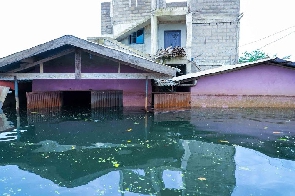 Flood-affected areas in the Volta Region
Flood-affected areas in the Volta Region
In the wake of a devastating flood caused by the deliberate release of water from the Akosombo and Kpong Hydroelectricity installations, communities along the Lower Volta Basin are on the brink of a looming health crisis, the main opposition National Democratic Congress (NDC) has said.
According to the NDC, the repercussions of this avoidable disaster are manifold, with challenges ranging from contaminated water sources to an increased risk of disease outbreaks.
The NDC in a statement signed by its Volta Regional Communications Officer, Sorkpa Kafui Agbleze raised the following concerns:
North Tongu
In North Tongu Constituency, reports indicate a surge in recorded cases of malaria and diarrhoea.
A total of seventeen health workers, including nurses from various health facilities, have been left homeless due to the flooding.
South Tongu
The South Tongu District Hospital is overwhelmed due to the closure of the Comboni Polyclinic, which was submerged by the floodwaters. The largest state health facility in Sogakope is witnessing a spike in outpatient department cases, with some patients having to sleep on the floor due to limited bed capacity.
South Dayi
The Kpongbonikope facility in South Dayi has been entirely cut off, hampering the access of Adzibui residents to healthcare services. People in these riverine areas within South Dayi are forced to use polluted floodwater that has passed through public toilets, septic tanks, and morgues for their domestic and commercial purposes, exposing them to faecal-oral diseases and waterborne illnesses.
North Dayi
Communities like Awate, Tornu, Tsorxor, and Wusutakpebi mostly rely on water from the Volta Lake, which is now polluted. With the boreholes in these areas broken down, residents have no choice but to use contaminated water from the Volta Lake.
Ketu South
Health facilities in Hatsukope and Blekusu have been forced to close due to the floodwaters. Klikor and Blekusu are now cut off, making it difficult for other communities to access healthcare services.
Keta
People in Anyako, Seva, Borlorve, and Norlorpi are struggling to access healthcare. Residents of Anyako are also facing challenges due to insufficient water supply.
Anlo
Medical facilities in Kodzi, Galo-Sota, Trekume, and Tregui lack essential medical supplies.
The Call by Volta NDC
In response to the dire situation, the National Democratic Congress (NDC) in the Volta Region has issued a call for immediate action:
They urge the Minister for Sanitation and Water Resources, Hon. Freda Prempeh, to increase the supply of piped water to the affected areas, particularly in South Dayi and North Dayi Districts.
The NDC demands the urgent repair of damaged boreholes and the construction of new mechanized boreholes in areas with pressing water needs.
They implore the Ministry of Health to launch an intensive health campaign in the affected regions and devise innovative solutions to alleviate the pressure on the Sogakope District Hospital.
There is a call for an increase in the deployment of mobile clinics in inaccessible areas.
The NDC is also advocating for a boost in the supply of medical consumables to the affected areas to ensure proper healthcare delivery.
In conclusion, the recent flood, stemming from the controlled release of water from the Kpong and Akosombo hydroelectric installations, poses a grave health crisis for communities along its banks.
The aftermath of this preventable disaster necessitates immediate and comprehensive support from the government to address the health and environmental challenges these communities now face.
Urgent relief efforts, long-term mitigation strategies, and robust healthcare support are imperative to help these communities recover and rebuild their lives in the aftermath of this catastrophe.